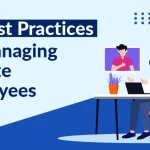
15 Best Practices for Managing Remote Employees
30/12/2024
India Surpasses Japan in the Asia Power Index: 5 Factors Driving the Change
02/01/2025- What does a BPO company do?
- What are the Top 12 BPO Recruitment Strategies for hiring the best talent?
- Why Do BPO Companies Need Specialised Recruitment Strategies in 2026?
- When Should BPOs Partner With a Recruitment Agency?
- How does Alp Consulting Ltd help BPOs Build Scalable Recruitment Models?
- Key Takeaways
- FAQs- Frequently Asked Questions
The BPO Industry has been growing at a rapid pace, but has also been faced with the struggles of recruiting the right people. From skill shortages to the changing needs of customer-facing operations, BPO providers are constantly working towards finding and recruiting the right talent.
Considering the same, developing new, efficient BPO recruitment strategies has become the need of the hour. Recruitment marketing, recruitment marketing automation can be crucial aspects when it comes to attracting the right candidates to the industry.
HRs in the BPO business or BPO business recruitment services providers would have certainly faced the many challenges that come with recruiting the right individuals. However, by preparing ahead, it’s possible to stay on top of the BPO recruitment game.
As per reports, the global BPO market size is likely to reach $200.85 billion this year.
Before exploring some of the top modern BPO recruitment strategies that will help you make the right hires, let’s look at what a BPO company is and does.
What does a BPO company do?
A BPO company or BPO service provider provides services and resources that can help businesses handle certain specific functions like customer services, accounting, administration, payroll, hiring, management and many more, while allowing them to focus on their core business operations, such as building and marketing their service or products.
Additionally, by engaging the services of a BPO service provider, companies can get work done for a lot less money while getting the same work done when executed with an in-house team, which would have cost a lot more.
What are the Top 12 BPO Recruitment Strategies for hiring the best talent?
While the main aim of a BPO company is to provide the best services to their clients, it’s important to bear in mind that to do so, BPO companies must have great employees. Here are some of the best BPO recruitment strategies that can help them acquire the right talent.
1. AI-enabled Smart Hiring
AI tools and platforms are integral to the modern BPO hiring landscape today. BPO recruitment process usually involves hiring of employees in large numbers in a short period, so the efficiency in the screening and hiring process must be extremely high. Advancements in automation have made this process faster and more effective, with many BPOs adopting automated pre-screening tools.
With automation software, you can easily scan documents, such as resumes and cover letters, for specific keywords that match job requirements. This technology helps quickly identify qualified candidates, ensuring that only the most suitable individuals progress to the interview stage.
According to research, recruiters now use “Agentic AI” to manage 80% of transactional tasks, including scheduling, compliance checks, and initial Q&A. This allows human recruiters to act as talent advisors.
2. Skills over Experience
BPO hiring strategies today are based on factors like hiring that is powered by the skills of individuals, rather than focusing on their past experiences. Core skills like communication, problem solving, digital literacy, adaptability, etc, matter today in BPO hiring and competency assessments are made that evaluate the ability to perform in the real world.
3. Employer Branding is Key
In a world full of millennials and Gen Z candidates, the expectations have transformed, and these generations are not just interested in getting a job and joining companies. They want more in terms of learning opportunities, a flexible working arrangement, a positive work culture, etc. Employer branding can be enhanced through various channels, like social media, websites, etc, by highlighting the values, culture, goals, etc, of a company, projecting a people-centric approach.
4. Utilise Data-Fuelled Hiring
Capitalising on crucial data and introducing analytics in the hiring system can do wonders. The implementation of predictive analysis can gauge the risk of early attrition, how successful an onboarding process is, etc. Hiring can be smarter and faster with analytics tracking critical metrics like time to hire, cost per hire, offer acceptance rate, training success rate, etc. Every stage of the BPO hiring journey gets optimised with intelligent data analytics systems.
5. Enhance Virtual and Remote Hiring
The BPO world has realised the significance of recruiting professionals virtually. BPOs today focus on conducting well-structured online interviews, digitally enabled documentation, video interviews and 24/7 online communication, providing constant feedback. This approach helps companies to widen their talent bank and tap into tier 2 and tier 3 cities, attract international candidates and gig workers.
6. Prioritise Candidate Experience
Candidates today are clear about what they want out of a job and about their career prospects. They assess the hiring journey thoroughly and expect a pleasant experience that includes setting job expectations clearly, transparent communication processes, instant feedback, respectful interactions, etc. A positive candidate experience upholds the reputation of a brand, and even if candidates are not hired, they become brand advocates.
7. Invest in Training and Upskilling
The BPO sector requires a lot more effort from companies and HR managers even after the recruitment process is completed. There must be a well-designed training program that will enable new employees to be prepared for the future with skills and adequate knowledge. Firms that focus on continuous learning and development processes will experience a high level of retention and enhanced customer satisfaction.
8. OffshoringTalent Challenge Handling
As part of their BPO recruitment plans, most BPO companies ensure that they build a talent base in various regions and locations, engaging in the strategy of offshoring talent. Often, when setting up offshore BPO teams, it must be done swiftly, as there may be hundreds or thousands of positions to fill.
Offshoring talent is mostly carried out by businesses as local talent is a lot more expensive, scarce, or the individuals lack skills. For example, when a BPO company offshores talent for business development managers, it would be because they may need individuals with specific expertise and experience.
9. Adoption of a long-term hiring strategy
BPO jobs have been known to be stressful with lower pay grades. This, often, is the reason for high turnover rates in the BPO industry. But the attrition rates are not entirely due to this reason alone. One of the main reasons for higher attrition is also associated with a mismatch in job expectations.
This reason, however, does have a solution. By evaluating candidates using realistic job previews via videos during the selection process, it was much easier to help set the right job expectations.
10. Predict hiring needs
The advent of automation has drastically changed the staffing needs of BPO service providers. BPOs now seek specific skills in candidates, unlike in the past, when only general staff were hired.
Also, because the majority of the BPO services are customer-related, BPO service providers must adapt their business models and staffing needs. They need to do so to match the changing preferences of the customers, as customers begin using multiple and newer channels for accessing support.
11. Up your sourcing game
The fight for local talent is quite fierce in BPO companies, as the volume of BPO companies has also grown by the day, and each one of them is looking for talent that counts. Getting creative with sourcing strategies, like pairing up with local unemployment offices and informing them about your job openings, can help you get access to a talented pool of candidates.
Organising an open hiring event and talking about your company’s job openings and the benefits they can expect can help too. Tying up with local colleges/campuses and setting up employee referral programs can also be a great way to source fresh graduates with skills and talented individuals.
12. Improvise your customer service strategy
BPOs often enhance their overall customer service to attract top talent. Companies that deliver exceptional customer experiences are more likely to appeal to job seekers. By prioritising attentiveness to customer needs and tailoring services to meet those needs, BPOs can build a reputation as reliable and customer-focused organisations.
Offering flexible pricing and service options that align with customer budgets further strengthens this appeal. Additionally, some BPOs encourage their employees to apply for roles within their clients’ companies, fostering deeper partnerships and expanding their professional networks.
Why Do BPO Companies Need Specialised Recruitment Strategies in 2026?
The BPO scenario in 2026 is not the same as it was a few years back. In a landscape influenced heavily by AI-driven platforms, hybrid delivery hubs, real-time service demands, etc. If you want to keep up with the latest trends and developments, you just formulate specialised recruitment strategies for BPO. Let us check out some of the strategies:
BPO Recruitment is rapid and large-scale
BPO organisations every year need to hire high volumes of individuals to cater to client delivery deadlines. Traditional recruitment processes can’t handle bulk recruiting processes, sudden seasonal demands, frequent recruitment cycles, etc. Specialised strategies involve streamlined bulk-hiring workflows, an AI-powered resume screening, fast track onboarding, etc.
Attrition is a Major Issue
The BPO sector is still challenged by high attrition. The factors impacting attrition include night shift schedules, pressure to perform, career transitions, lack of role awareness, etc. Smart strategies entail realistic, accurate behavioural evaluations, cultural fit assessments, hiring that is in sync with growth, etc.
AI-backed BPO Environments
Today, there is an increasing demand for AI-powered tools and niche skills related to it. Talent getting hired in BPOs must be well-versed digitally, be aware of data flow, be able to adapt to new tools and techniques, and be able to manage sudden escalations.
Use Case- A leading British outsourcing and BPO provider, Capita (UK), publicly rolled out AI-powered recruitment tools to streamline high-volume hiring, automating screening and candidate matching to reduce time-to-hire significantly.
Client Experiences Directly Link to Hiring
The hiring quality is a key enabler for efficient customer service. BPOs are all about communicating directly with customers, so the agents must interact with ease, precision, clarity, empathy, and consistency. Therefore, the hiring methods must be different from generalist recruitment methods. Focus must be on specialised methods like communication evaluations, stimulations, listening tests, etc.
Multilingual and Cultural Competence Requirements
BPOs today provide solutions to countries across the globe. Companies must hire talent who are proficient in different languages, culturally aware, top-notch communicators, and possess behavioural styles that cater to global standards.
When Should BPOs Partner With a Recruitment Agency?
As we proceed in 2026, the recruitment processes are becoming more complex with external and internal influences shaping the ecosystem. BPO enterprises are comprehending the complexities and realising that it is quite an ordeal to manage the hiring process with only in-house teams. It is neither productive nor cost-effective.
This is when you, as a BPO partner with a reputable recruitment agency like Alp Consulting Ltd. A reliable partner like us can support you with scaling your operations faster, help alleviate hiring gaps, and assist you with hiring skilled talent, with recruitment strategies for BPO success.
How does Alp Consulting Ltd help BPOs Build Scalable Recruitment Models?
In this fast-evolving hiring landscape today, hiring is more than just filling vacancies and the most sought-after agencies like Alp Consulting Ltd, with their expert team and experience, support BPOs to upscale or downscale fast, provide constant support to enhance operations, by designing data-enabled and future prepared recruitment models.
Our expertise has helped major global BPO leaders like Cognixant, Microsoft, HCl with effective hiring methods. We have provided them with talented professionals and facilitated the process of bulk hiring. We also helped them with seasonal demands and project-based onboarding by utilising our vast candidate networks and talent pool. Our techniques are AI-enabled, expediting processes and making them impactful.
Each BPO recruitment strategy of ours entails approaches that involve specialised recruitment, retention-centric models, compliant-ready procedures and many more.
Key Takeaways
- AI-enabled, data-driven hiring is now critical for BPOs.
- Skill-based hiring has replaced experience-based hiring
- Candidate experience, employer branding, and long-term hiring strategies drive retention.
- Remote, multilingual, and offshore hiring models expand talent access.
- Recruitment partners like Alp Consulting help BPOs scale predictably.
FAQs- Frequently Asked Questions
1. How to get candidates for BPO?
To get candidates for BPO, some of the sourcing strategies you can use are- deploying referral bonus programs, community recruitment, advertising on social media, workforce centres, unemployment offices and staffing firms.
2. What is the BPO sourcing strategy?
A business process outsourcing (BPO) sourcing strategy involves a company contracting with a third-party provider to handle specific business processes. Their main aim is to allow companies to focus on their core competencies while freeing up resources to handle other tasks.
3. What are some successful practices in BPO recruitment?
Some of the best BPO recruitment practices include building a strong employer’s brand, automation of the screening process, providing constructive feedback, offering incentives, and developing an effective onboarding process.
4. How to attract young talent for BPO?
Some of the best ways to attract young talent for BPO are by offering employee development, promotion of younger talent, showcasing diversity, recognising and rewarding talent, offering flexible work options and investing in personal and professional development.
5. What skill-based assessmentsshould be usedfor BPO recruitment?
Some of the skill-based assessments that can be used are- cognitive ability tests, programming skills test, situational judgement tests, typing speed tests, role-specific skill tests and more.
Contact Us For Business Enquiry

Amit Saproo
Amit Saproo is the Head of Operations at ALP Consulting with nearly 17 years of experience in Executive Search, RPO, Leadership, and IT & Engineering recruitment. He leads nationwide recruitment programs across Technology, BFSI, and R&D domains, driving strategic hiring solutions for diverse client needs. Amit excels in building and managing high-performance teams that deliver scalable, end-to-end recruitment and consulting services.




